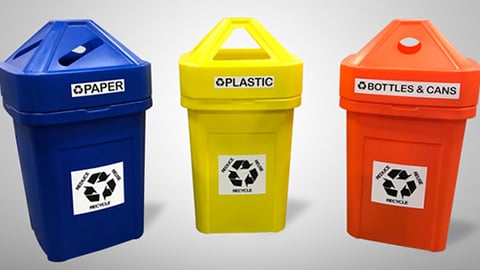Sustainability Takes Center Stage
It’s a bit of an understatement to say that health concerns are currently driving consumer behaviors and purchases in today’s marketplace.
Research conducted by Paris-based Ipsos in July showed that 85% of consumers are concerned about the COVID-19 outbreak. According to the Washington, D.C.-based International Food Information Council, that same percentage of consumers (85%) reported that they’ve changed the way they eat or prepare food in the wake of the pandemic.
While the novel coronavirus is a major, and arguably overriding, worry, that doesn’t mean that people aren’t making decisions based on other timely situations, from social issues to environmental concerns.
Key Takeaways
- According to research, products with a sustainability claim have continued to grow during the pandemic.
- Industry insights back up the potential for reusable and/or refillable packages.
- Current concerns about health, wellness and sustainability will continue to shape choices in products and packaging.
On the environmental front, research released in July from Chicago-based IRI and the NYU Stern Center for Sustainable Business reveals that products with a sustainability claim have continued to grow during the pandemic. In fact, seven in 10 consumers said that they’re buying as many or more eco-friendly products than they did prior to the emergence of COVID-19.
Those findings affirm what another study found a few months ago. In a survey conducted by the Chicago-based Kearney consulting firm, nearly half of consumers said that the pandemic has made them even more concerned about the environment, and 11% reported that they’d changed purchases in the past year based on environmental claims.
CPGs and retailers are continuing with their own sustainability efforts in this issues-dominant year. In July, retailers such as The Kroger Co., Walmart, Target, CVS Health and Walgreens revealed that they’re working with the Consortium to Reinvent the Retail Bag to find alternatives to single-use plastic shopping bags.
Sustainable packaging continues to be a focus for many CPGs and retailers. While many innovations have focused on reducing packaging materials and moving to recyclable packaging, reusable packaging and the use of reusable containers to move products through the supply chain represent another aspect of this issue that has caught the attention of those who make, sell and buy goods.
Consumer Packaging Put to Good (Re)Use
Industry insights back up the potential for reusable and/or refillable packages with a consumer base that remains engaged with the goal of greater sustainability. A report from New York-based CB Insights identified reusable packaging as one of 15 growing trends across the food, beverage and household essentials market in 2020.
According to research from the New Plastics Economy Global Commitment, one-third of product and packaging companies said that they’re testing durable packages for reuse. The research also confirmed that while the current pandemic has slowed the use of things like reusable shopping bags at supermarkets and reusable personal cups at retail coffee chains, the public health crisis hasn’t halted the growth of all reusable solutions for consumer goods.
Paul Kamholz, VP of sales and marketing, North America for Goodyear, Arizona-based logistics and packaging solutions provider Schoeller Allibert, agrees that current concerns about health, wellness and sustainability will continue to shape choices in products and packaging.
“Europe has been ahead of North America in sustainability for a variety of reasons, but the people there are accustomed to the discipline required, and understanding of any potential ‘inconvenience,’” notes Kamholz.
In the current market, forms of reusable packaging vary. Consumers can refill, reuse or return packaging at home or on the go, depending on the product and where and how it’s consumed.
One collaboration causing some buzz is the partnership between CPGs and the Loop program, from Trenton, N.J.-based TerraCycle. Through this program, consumers buy products in a durable package from Loop’s website or a partner retailer’s website. After consumers finish the product, they put the empty package in a tote that will be collected by Loop, and then cleaned, sanitized and returned for another use.
Earlier this year, TerraCycle revealed plans to make reusable packaging through Loop accessible in brick-and-mortar stores, first in Canada and the United Kingdom, and then eventually in U.S. cities.
Cincinnati-based Procter & Gamble is one manufacturer that has taken part in the Loop program, designing durable and refillable packaging for several of its brands. Pantene, for example, is launching a bottle for shampoo and conditioner made with lightweight aluminum, Tide plans to sell its plant-based laundry detergent in a stainless steel bottle, and Crest is set to introduce Crest Platinum mouthwash in a sustainable, refillable glass bottle.
The Colgate-Palmolive is brand is also part of the Loop, creating a toothpaste tube made of high-density polyethylene. Food products are available through the Loop as well, such as Häagen-Dazs ice cream shipped in a stainless steel double-walled container.
Other brands, including niche brands with a sustainability focus, are starting to offer reusable packaging on their own. For example, Lebanon, New Hampshire-based organic egg company Pete and Gerry’s is testing a reusable egg carton made from recycled BPA-free plastic at co-op stores on the East Coast.
Consumers may be able to get away from single-use plastics in other areas of the grocery store, too. A recent report on “The Smart Supermarket” from London-based Greenpeace recommends reusable containers for prepared food sold in grocery stores. The report cites a program in Europe in which consumers get a reusable box at the store to fill at the salad bar and then return when they're finished with it. Another model is to allow customers to bring their own containers to buy prepared foods and certain perishables, something that would likely not be ideal during a global pandemic, but might have potential when the marketplace returns to some normality.
Meanwhile, the notion of zero-waste stores has moved beyond concept to reality: Various stores, co-ops and markets billed as zero waste encourage shoppers to bring in containers and packaging from home.
Kamholz believes that reusability will continue to be embraced by concerned consumers. “In years past, broad adoption of reusable packaging didn’t make financial sense, because the grocery retailers and their suppliers would lose a high percentage of the packaging asset without the commitment and dedication of everyone,” he explains. “We’ve made great strides as a country and believe [in] a more sustainable future where returnable packaging becomes the norm.”
Go With the Flow
While the push to reduce package waste is leading to the development of reusable packaging for consumer products, those in the material-heavy CPG and retail industries are looking at ways to reduce their own environmental footprints.
Many containers, trays and pallets on the B2B side of the food production and retail business are already reusable. According to the Tampa, Florida-based Reusable Packaging Association (RPA), recycled plastic containers (RPCs) are designed to be repeatedly used and cleaned for the transport of items like raw materials and commodities to manufacturers, and for the delivery of foods to distribution centers and warehouses.
Improvements in eco-friendly reusable materials are evident in the B2B market.
Oconomowoc, Wisconsin-based Orbis Corp., a subsidiary of Menasha Corp., recently introduced a new recyclable plastic material for reusable packaging as part of its Ocean in Mind initiative. “This initiative takes recycling and reusability a step further by recovering waste from coastlines and repurposing it back into our product,” explains Breanna Herbert, associate product manager and sustainability lead.
For its part, Schoeller Allibert is working with customers throughout the retail sector as more grocers adopt automated storage and retrieval systems and make changes to their infrastructures. According to Kamholz, the company offers a variety of storage containers and plastic pallets that provide a range of returnable solutions, including the Optishute, a 100% recyclable and 100% repairable plastic bulk dispenser, and the JumboNest, a container with up to 525 liters and 600 kilograms of capacity that’s stackable when empty.
Kamholz predicts that changing logistics, especially in e-commerce, will continue to drive new uses. “We understand a shift to returnable packaging requires significant change to infrastructure, specifically in reverse logistics,” he observes. “It’s a slow evolution that is slowly picking up traction.”
The COVID-19 situation may be facilitating that traction, since the pandemic has accelerated the adoption of grocery e-commerce by consumers. To help grocers save time and materials while picking online orders, North Billerica, Mass.-based Alert Innovation offers an e-grocery micro-fulfillment center solution that automates the process, with features like chilled totes that eliminate the need for temperature-controlled trucks or freezers/refrigerators. Robots can also be used to drop off small totes to a self-service pickup area outside of a store.
On the topic of COVID-19, RPA has reiterated the U.S. Food and Drug Administration’s statement that there’s no evidence of food or food packaging being associated with the transmission of the virus. The organization also emphasizes the effectiveness of sanitation methods for food packaging, including reusable packaging that’s washed and sanitized after each use.









